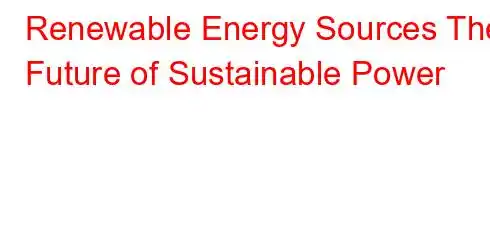Renewable Energy Sources: The Future of Sustainable Power
Renewable energy sources are energy sources that are constantly replenished and will never run out. These sources of energy are crucial for the future of sustainable power as they have a minimal impact on the environment and help reduce greenhouse gas emissions. Here are some of the most common renewable energy sources:
- Solar energy: Solar panels convert sunlight into electricity, making it one of the most abundant sources of renewable energy.
- Wind energy: Wind turbines harness the power of the wind to generate electricity, providing a clean and sustainable energy source.
- Hydropower: Hydropower uses the flow of water to generate electricity, often through dams and turbines.
- Geothermal energy: Geothermal energy utilizes heat from the Earth's core to generate electricity and heat buildings.
- Biomass: Biomass energy is produced from organic materials such as wood, crops, and waste, making it a renewable and sustainable energy source.
Renewable energy sources offer numerous benefits, including reducing dependence on fossil fuels, creating jobs in the green energy sector, and improving air quality. As technology continues to advance, renewable energy sources are becoming more efficient and cost-effective, making them an increasingly viable option for meeting global energy needs.
Investing in renewable energy sources is essential for combating climate change and building a more sustainable future. By transitioning to renewable energy sources, we can reduce our carbon footprint and create a cleaner, healthier planet for future generations.
Okunma: 1


